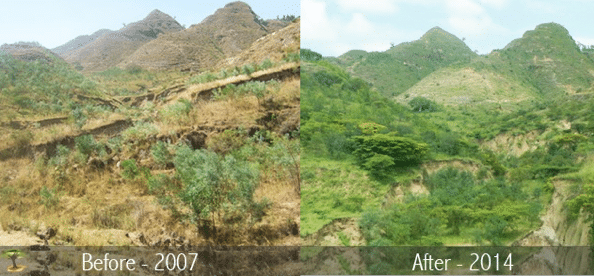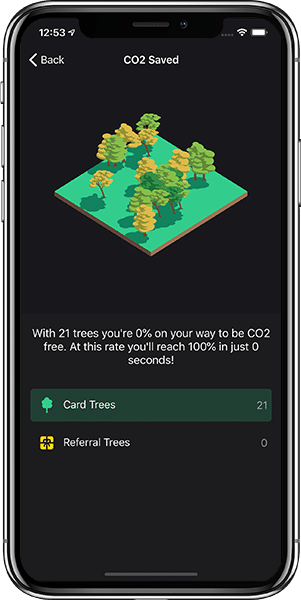Letztes Update: 28. September 2023
As announced in early November, neon is now releasing neon green. On the crowdfunding platform wemakeit, neon is currently raising money to further develop the pilot project. For a one-time fee of CHF 95, you get the neon green account app, which has exactly the same basic features as the normal neon app, i.e. an account without basic fees with the Swiss deposit guarantee of CHF 100,000, no exchange rate surcharges when paying abroad and online, and low-cost transfers in foreign currencies. And with neon green, an additional tree is planted for every CHF 100 you spend with your neon green card. Of course, neon’s employees don’t go out themselves with a shovel and plant trees in the middle of Zurich. Eden Reforestation Projects serves as the partner. You can find out more about this non-profit organization below.
Meanwhile you can open your neon green account independently from wemakeit. You can find the article about the official launch with the monthly fee here.

neon green
In the neon green app you can see your tree statistics and always know how many trees have been planted for you. And where did neon get the money to plant the trees? When using a credit card – regardless of the issuer – the merchant incurs interchange fees. An example and rather simplified: You shop at a retailer for CHF 10 and pay contactless with your credit card, then the retailer pays 0.4% – so 4 centimes – interchange fees. There are, of course, many more parties involved, and depending on the payment method and merchant, interchange fees vary, but that would be material for a blog post of its own.
For wemakeit supporters, neon green will be free for life. Later, a monthly fee will be charged for all new neon green customers.
The goal is to make compensation even smarter with input from the community. For example, additional compensation is to be offered for a flight or a tank of gas.
Already 10 hours after the publication on wemakeit the minimum goal of CHF 25’000 was reached. A maximum of 1,750 green Mastercards will be issued. In the meantime, CHF 132,894 (as of 11/21/2020; noon) has been raised with 8 days remaining.
Eden Reforestation Projects
The nonprofit organization was founded in Ethiopia in 2004 by Dr. Stephen Fitch. There, huge areas of land have been decimated by deforestation. Under the “Employ-to-Plant” method, sustainable jobs have since been created for the local population and the forest has been restored and protected. Natural biodiversity is returning, providing habitat for endangered species. At least 10% of the trees to be planted are fruit trees that serve food security. Over time, these trees should provide an additional sustainable source of income.
Since then, kindergartens and reforestation projects have been launched in Madagascar, Haiti, Nepal, Indonesia, Mozambique, Kenya, Nicaragua and Honduras. Around 15 million trees are added each month. Also nice to know: Planting a tree costs USD 0.10. These costs cover all expenses, including nursery costs, transportation of seedlings to reforestation sites, planting, guarding, and weeding to allow for a head start on vegetation. Incidentally, the organization is considered one of the most cost-effective reforestation projects in the world.

And does that bring anything at all? A much-discussed study by ETH Zurich has shown that reforestation, in addition to emissions reductions, is a valuable means of combating climate change.
Let’s take another look at the trailblazers and learn how other financial institutions are handling climate neutrality.
Bunq

The Dutch fintech company has been around since 2012, and has had a banking license since 2014. It advertises itself as being as flexible as a Swiss Army knife and more secure than Fort Knox.
In April 2020, bunq “Premium SuperGreen” was launched. This banking package costs EUR 16.99 per month. Pay twelve months in advance and you’ll receive a stylish, sustainable stainless steel Metal Card for free. 50% less plastic is used in their manufacture, and they are said to last 50% longer than a regular plastic card.
By the way, for cheap and fast transfers in foreign currencies with the real exchange rate, they, like neon, work with Wise, formerly TransferWise.
bunq is also the only bank in the world where you can decide how your money is invested. You can easily select that in the app. And if you don’t want your money to be invested at all, you can select that in the app as well. In this case, you waive the interest. Yes, there are still countries where you get interest. For bunq this is 0.27%. In Switzerland, you don’t even get that much on your pillar 3a account anymore. You’ll be lucky if you get half as much. But that is another topic.
And now for the actual compensation: For every EUR 100 you spend with one of the cards, bunq plants a tree. In less than two years you will be CO2 neutral.
So similar to neon. Even the partner planting the trees is the same: Eden Reforestation Projects.
And no, this is not an advertisement for bunq, as a Swiss you can’t open an account there yet anyway, I just wanted to show you how other fintechs are trying to make financial services greener.
Swiss alternatives
There are, of course, similar efforts in Switzerland as well. Basellandschaftliche Kantonalbank (BLKB), for example, has been climate-neutral since 2019. The CO2 emissions have so far been offset by international projects. From 2021 onwards, compensation will then take place locally by means of humus growth as a CO2 reservoir. Do you know of other efforts and projects? Then use the comment function below.
All exciting projects, but better than compensation, of course, is reduction, and that starts with each individual.
Advertising
Transparency and disclaimer
I was not paid by anyone for this blog post, it reflects my subjective opinion.
If you open accounts or business relationships, order products or services through my links and codes, I may receive a commission for doing so. However, you will not suffer any disadvantages such as higher prices or the like. The terms and conditions of the respective providers apply. Affiliate links are marked with a *.
Investments are associated with risks which, in the worst case, can lead to the loss of the capital invested.
All publications, i.e. reports, presentations, notices as well as contributions to blogs on this website (“Publications”) are for information purposes only and do not constitute a trading recommendation with regard to the purchase or sale of securities. The publications merely reflect my opinion. Despite careful research, I do not guarantee the accuracy, completeness and timeliness of the information contained in the publications.


